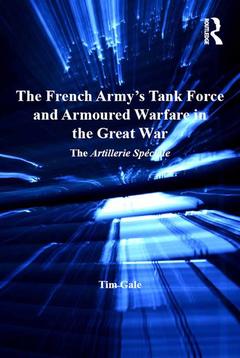Description
The French Army's Tank Force and Armoured Warfare in the Great War
The Artillerie Spéciale
Routledge Studies in First World War History Series
Author: Gale Tim
Language: English
Subject for The French Army's Tank Force and Armoured Warfare in the...:
Keywords
chamond; schar; infantry; les; chars; light; artillery; fire; german; nivelle; St Chamond; Groupement III; Tank Regulations; SRR; Char 2C; Counter-battery Fire; Medium Tanks; Nivelle Offensive; Light Tank; Vi Army; French Infantry; Machine Gun Fire; Tank Units; Artillery Preparation; Infantry Commanders; De La Guerre; French Tanks; Heavy Tank; Iii Army; Tank Section; German Artillery; Infantry Advance; Section Commanders; Iv Army; Compte Rendu
Publication date: 10-2013
Support: Print on demand
Publication date: 09-2016
· 15.6x23.4 cm · Paperback
Description
/li>Contents
/li>Biography
/li>




